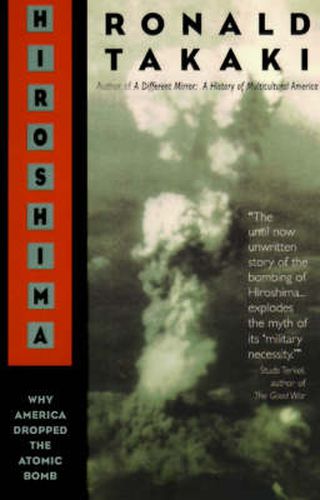Readings Newsletter
Become a Readings Member to make your shopping experience even easier.
Sign in or sign up for free!
You’re not far away from qualifying for FREE standard shipping within Australia
You’ve qualified for FREE standard shipping within Australia
The cart is loading…






The bombing of Hiroshima was one of the pivotal events of the twentieth century, yet this controversial question remains unresolved. At the time, General Dwight Eisenhower, General Douglas MacArthur, and chief of staff Admiral William Leahy all agreed that an atomic attack on Japanese cities was unnecessary. All of them believed that Japan had already been beaten and that the war would soon end. Was the bomb dropped to end the war more quickly? Or did it herald the start of the Cold War? In his probing new study, prizewinning historian Ronald Takaki explores these factors and more. He considers the cultural context of race - the ways in which stereotypes of the Japanese influenced public opinion and policymakers - and also probes the human dimension. Relying on top secret military reports, diaries, and personal letters, Takaki relates international policies to the individuals involved: Los Alamos director J. Robert Oppenheimer, Secretary of State James Byrnes, Secretary of War Henry L. Stimson, and others… but above all, Harry Truman.
$9.00 standard shipping within Australia
FREE standard shipping within Australia for orders over $100.00
Express & International shipping calculated at checkout
The bombing of Hiroshima was one of the pivotal events of the twentieth century, yet this controversial question remains unresolved. At the time, General Dwight Eisenhower, General Douglas MacArthur, and chief of staff Admiral William Leahy all agreed that an atomic attack on Japanese cities was unnecessary. All of them believed that Japan had already been beaten and that the war would soon end. Was the bomb dropped to end the war more quickly? Or did it herald the start of the Cold War? In his probing new study, prizewinning historian Ronald Takaki explores these factors and more. He considers the cultural context of race - the ways in which stereotypes of the Japanese influenced public opinion and policymakers - and also probes the human dimension. Relying on top secret military reports, diaries, and personal letters, Takaki relates international policies to the individuals involved: Los Alamos director J. Robert Oppenheimer, Secretary of State James Byrnes, Secretary of War Henry L. Stimson, and others… but above all, Harry Truman.